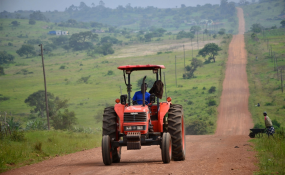Presidential spokesman Garba Shehu says efforts to get the nation out of its present economic challenges is beginning to yield positive results, especially in the area of agriculture.
The presidential aide said this in a statement issued in Abuja on Sunday.
According to him, an increase in the volume of rice production and processing across the country is already saving the country a lot of foreign exchange.
Shehu, who is the Senior Special Assistant on Media and Publicity to the President, said that Nigeria only imported 58,000 tons of rice from Thailand in 2015 as against 1.2million tons in 2014.
He revealed that due to the country’s growing rice production occasioned by the Central Bank of Nigeria’s decision to deny foreign exchange for the importation of rice “parboiled rice mills” in some Asian countries were shutting down production.
According to him, this is because Nigeria, which is one of the world’s largest importers of rice no longer, buys rice from them.
“Five of such mills in Thailand servicing Nigeria have stopped production due to the withdrawal of our patronage,” he added.
According to him, government is watching with keen interest the growing investment in rice milling by the private sector.
He said government would continue to encourage the Ministry of Agriculture on such efforts through BUA Industries in Jigawa and Dangote in Kano.
He said such encouragement would also be extended to OLAM and WACOTT in Nassarawa and Kebbi as well as a consortium of businessmen led by a former governor in Anambra.
The presidential aide noted with delight that the price of a bag of fertilizer had been reduced from over N9, 000 per bag to 5,500.
“This country has about 32 fertilizer blending plants that have remained idle for many years, but that about half of that number is now in production with many of them running three shifts a day.”
He said some of the blending plants had now provided direct employment to hundreds of workers and indirect employment opportunities to thousands of others.
Shehu said that the Buhari administration’s agricultural revolution was bringing about other socio-economic changes in the country.
He said that a recent survey carried out in two urban areas of Jigawa and Kiyawa showed that jobless young men were migrating from commercial motor cycle business known as, ‘achaba’, to farming.
“In Kiyawa, it takes a long wait to catch a commercial motor cycle because they are rapidly disappearing.
“The young men are moving to the farms. These are development issues in the country that our media should pay attention to,” he added.
The presidential spokesman frowned at the way and manner some elites had continued to attack some government policies and programmes in spite of their positive impacts on the life of the ordinary Nigerians.
“Because the elite don’t care for ordinary people, they are saying that government is doing nothing but we are doing a lot for ordinary people.
“They don’t want us to talk about the 14 solar power projects that have been licensed to boost electricity supply in the country; the Mambila power project which will soon leave the drawing boards and the many Chinese projects including the standard gauge railway.
“This country has more important things to talk about instead of dwelling on trivialities.”

